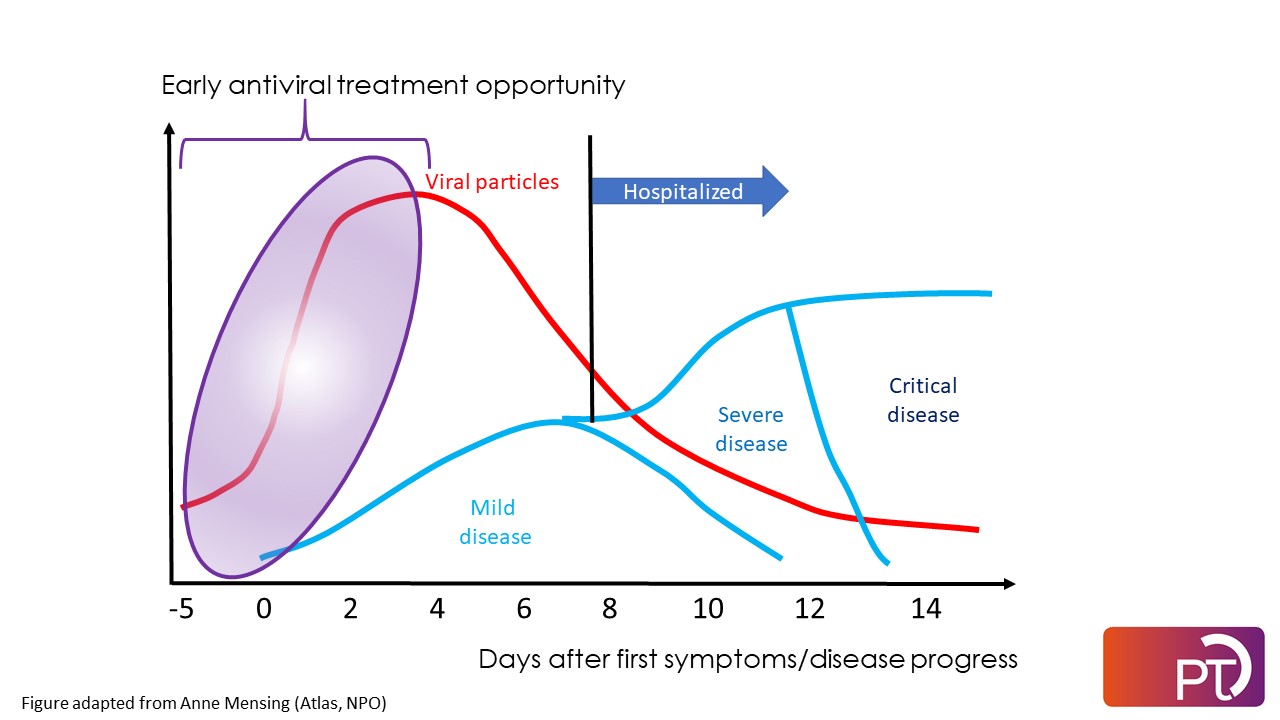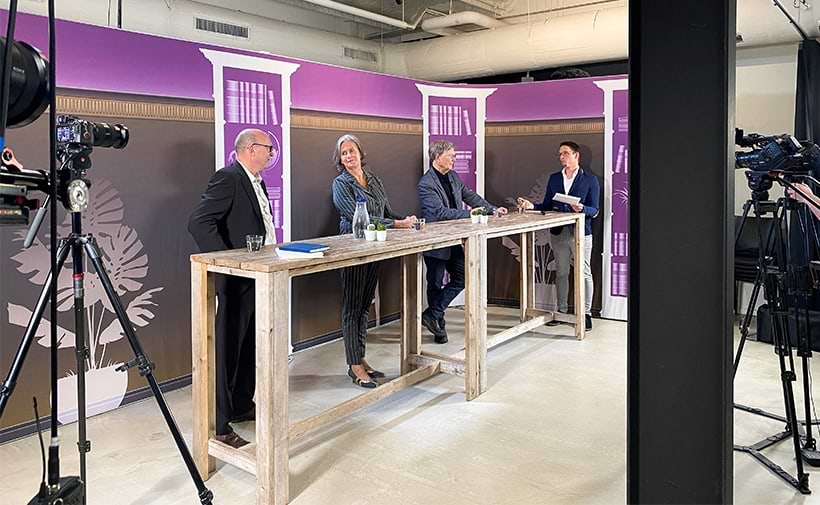The current pandemic is not the first and will not be the last we have to deal with. Factors like globalization, global warming and zoonoses increase risks for new large-scale virus outbreaks. Ab Osterhaus (virologist and infectious disease expert) Clémence Ross-van Dorp (ambassador top sector Life Science & Health) and Bernd van Buuren (CEO of Protinhi Therapeutics) shared their expertise and discussed how we should prepare for future pandemics during the round table organized by Kadans Science Partner during Health Valley Event 2021.
The current pandemic took us by surprise, that is how Ab Osterhaus started to paint the picture of the covid-19 situation we are currently in. “We were not prepared; this is a lesson to be learned” is what Osterhaus said. As we are seeing more outbreaks of infectious diseases, there is a number of things we can do to prepare for the future. The interpandemic period, the ‘peace’ time between various outbreaks, is the time we should prepare to not be taken by surprise again.
Clémence Ross-van Dorp agrees that we weren’t sufficiently prepared for this pandemic. We all had to react quickly to the outbreak of covid-19. “In the Netherlands, we know how to find each other, and we learn very rapidly. We have learned and put it into practice so we can also play our part in the global discussion”. To increase our preparedness Ross-van Dorp says we need to have a good ecosystem in place in order to contribute to the solution. This ecosystem includes working together with the industry. Osterhaus agrees that collaboration is key. “It is extremely important that we have this collaboration. If we look where the solution is coming from at the moment, it is diagnostics, tests, and vaccination”, Osterhaus said referring to companies working on these solutions. “This collaboration between the basic science on the one hand and the pharma industry on the other hand is absolutely necessary. We have to stimulate that”.
Investing in the future
A company working on possible solutions for other viral outbreaks is Protinhi Therapeutics. Protinhi is working on antivirals. Antivirals can be used to treat viral infections. Hepatitis C and HIV for example have been tackled by using antivirals, while vaccine development has proven to be difficult. Antivirals can also be developed to tackle a broad spectrum of viruses. “This broad-spectrum approach is something we should have in place before a pandemic comes”, says Bernd van Buuren. “This way we can treat from early on and hammer down the virus”.
Policy makers see that what companies like Protinhi do is very valuable work. “But unfortunately, that has not reflected to the amounts of funding that we really need to also make something against covid. Because we believe that we had something one year ago that could work against covid, but we couldn’t get enough funding to get it to go fast enough to make a difference”, says Van Buuren.
To test discoveries from the lab in an industry environment, a private-public consortium was set up including Protinhi. Private parties are needed here to rapidly progress to clinical stage trials. Ross-van Dorp followed to say “I love that you say private-public partnership, because I’d like to see investments and not subsidies. I think it’s very important to acknowledge that with public money we can encourage investments to flourish and take part in the outcome of the investment.”
The same is important for education. Students going into science need to know that when they are successful, they are able to go into the pipeline of valorization. They need to know how to find the partners that they need within the ecosystem. “We have to think about the chances that we want to take instead of thinking about what it’s all going to cost, because it is an investment”, said Ross-van Dorp. With taking chances also comes risk. There is a lot of failure with the development of new therapies or vaccines. “We have to accept failure”, says Osterhaus. “We have to realize that you have to try a lot to finally come to a solution. It is expensive, but what we are doing now by not reacting is more expensive”.
Future strategies
We are still in the middle of the AIDS pandemic, ten years ago we had the swine flu pandemic (also known as Mexican flu) and now we are facing a pandemic of a coronavirus. What other pandemics are looming? Osterhaus says, “After the Mexican flu pandemic, a lot of people said well this is in the past, this is not going to happen again.” Now we are facing a situation where another outbreak can happen tomorrow. “We better be prepared, we have all the means to do it, but we have to invest. Private-public partnerships are so crucial, we have to make that connection”, Osterhaus continues.
With antivirals we may be able to tackle whole virus families. Any outbreak can be fought by reacting early on. Just as testing early on is important, it is the same story for why it is important to treat early. Van Buuren explains that by using antivirals to treat in the early stage, there is no spike in the development of the viral infection in the body which means you don’t get as ill. Osterhaus continues to say “Bernd for example is working on Dengue, which is not a pandemic at the moment, but it is a huge disease which kills a lot of people. I think it is important to prepare for viral families. Basically, you go for an antiviral or vaccine that has a broad reactivity.”

We can research and work on antibodies, antivirals, or vaccines during the interpandemic period, so that when another pandemic hits we can react quickly and treat or vaccinate from early on. We do the same for a pandemic of influenza. “If we invest during the interpandemic time, invest heavily in these intervention strategies, I think we will be able to react even faster, like we can do for influenza”, Osterhaus says. “That means collaboration, with international organizations, European consortia going for broad reactive strategies”. Ross-van Dorp continues to add that it is not all about antivirals and vaccines, but that we have to invest in the ‘grid’. “We have to focus on our national team to play the international game”, says Ross-van Dorp. “If we only focus on vaccines and viruses, we lose sight of the other stuff. And it’s all connected. So, I’d say invest in the grid: in data, digitalization and regulation.”
Ross-van Dorp stimulates companies to keep on going with what they are doing, even if it is not their company that is important during this pandemic. Everything counts. “It is all about partnering, but first you need to be strong. […] Know what you need as a partner and go for it” says Ross-van Dorp.
“What we are spending on science and development of new products at the moment is not enough if you compare it to what this crisis costs in terms of billions of euros” says Osterhaus. He says it is important to have a holistic view. You need early warning models, discovery platforms, diagnostics platforms, and mathematical models, but also clinical trial platforms. “So far, we only had the non-pharmaceutical intervention strategies, such as the distance that we are keeping and how we are sneezing” says Osterhaus. The last addition this list is communication. All experts agree that we need to communicate, not only with the large public but also between the industry and public sector. We need to connect with each other to discuss and react quickly.
As we all are highly motivated to work on solutions, we have to work together. Collaboration is key and it can’t be done by just one country or party, we all need each other to hammer down future pandemics.

